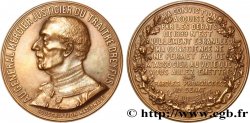Live auction - fme_949046 - III REPUBLIC Médaille parlementaire, Chambre des députés, XVIe législature
Чтобы принять участие в торгах, вы должны войти в систему и стать подтвержденным участником аукциона. Войдите, чтобы сделать ставку. Ваш аккаунт будет подтвержден в течение 48 часов. Не ждите до закрытия торгов, чтобы зарегистрироваться.Сделав ставку на данный товар, вы вступаете в юридическое соглашение на покупку выбранного товара и нажатием кнопки «Сделать ставку» подтверждаете принятие вами условий интернет-аукционов cgb.fr.
Ставка может бить сделана только в полном эквиваленте евро. Торги закроются согласно времени, указанному в описании товара, все ставки, сделанные после закрытия торгов, учитываться не будут. Не следует откладывать предложение вашей ставки до последнего момента, так как система может не успеть обработать вашу заявку, и ваша ставка не будет принята. Более детальную информацию вы найдёте здесь: FAQ по интернет-аукционам.
Все ставки победителей подлежат комиссии 18%.
Все ставки победителей подлежат комиссии 18%.
| Оценить : | 180 € |
| Цена : | 300 € |
| Максимальная предлагаемая цена : | 360 € |
| Конец торгов : | 20 August 2024 16:44:35 |
| Участников : | 4 Участников |
Тип Médaille parlementaire, Chambre des députés, XVIe législature
Дата: 1936
Монетный двор / Город: 75 - Seine
Металл: silver
Проба: 850 ‰
Диаметр: 49,5 mm
Ориентация осей монеты: 12 h.
Гравер MONIER Émile Adolphe (1883-1970)
Вес: 66,24 g.
Век: lisse + corne 2ARGENT
Пуансон: Corne 2 ARGENT
Комментарии о состоянии
Patine hétérogène,traces d’usure sur les reliefs. Aspect presque marron de la médaille. Traces d’un léger nettoyage
Лицевая сторона
Аверс: легенда: REPUBLIQVE - FRANÇAISE.
Аверс: описание: Tête de la République à droite portant un bonnet ; au-dessous .EMILE MONIER. 1936..
Обратная сторона
Реверс: легенда: .CHAMBRE - DES DEPVTES. // LIBERTE. EGALITE. FRATERNITE // JOSEPH MASSE / CHER // 1936.
Реверс: Описание: Lion couché à droite reposant sur un cartouche ; au-dessous 1936, en arrière-plan la façade de l’Assemblée nationale (Palais Bourbon) et la signature E.M. Cartouche inscrit et date à l’exergue.
Комментарий
Médaille décernée au député du Cher Joseph Massé lors de son élection en 1936.
La médaille est conservée dans un pocheton en cuir sur lequel il est inscrit “Chambre des députés”. Cet ensemble est lui-même conservé dans une pochette en cuir, sur laquelle il est inscrit “Joseph Massé député”, fermée par un bouton pression, et contenant des lettres authentiques :
- Une carte de député dans un étui en cuir noir inscrit “Chambre des Députés” pour la 16e législature (1936-1940)
- Un ensemble de deux lettres du ministre de l’Éducation Nationale chargeant Joseph Massé de la “protection des richesses artistiques de la France pour les Monuments Historiques et les Musées Nationaux” (1940);
- Un laissez-passer permanent spécial aux membres du Parlement dont la photo a été arrachée (ou coupée) (1939);
- Un laissez-passer du ministère de la défense nationale et de la guerre, spécifiquement pour se rendre dans sa circonscription (1939);
- Une lettre du secrétariat général administratif attestant la délivrance d’une carte de circulation sur les chemins de fer pour l’année 1941
Joseph Massé (1878-1946) est un homme politique français. Diplômé de l'École des beaux-arts de Lyon, il est d'abord peintre puis est mobilisé pendant la Première Guerre mondiale. Il entre en politique en devenant en 1911 conseiller général de Levet, puis maire de Soye-en-Septaine à partir de 1919. Il est élu député aux élections législatives de 1936. Maintenu à son poste de maire de Soye-en-Septaine pendant l'occupation, Joseph Massé abandonne la vie politique à la Libération, après avoir été déclaré inéligible. Joseph Massé vota en juillet 1940 les pouvoirs demandés par le maréchal Pétain.
La médaille est conservée dans un pocheton en cuir sur lequel il est inscrit “Chambre des députés”. Cet ensemble est lui-même conservé dans une pochette en cuir, sur laquelle il est inscrit “Joseph Massé député”, fermée par un bouton pression, et contenant des lettres authentiques :
- Une carte de député dans un étui en cuir noir inscrit “Chambre des Députés” pour la 16e législature (1936-1940)
- Un ensemble de deux lettres du ministre de l’Éducation Nationale chargeant Joseph Massé de la “protection des richesses artistiques de la France pour les Monuments Historiques et les Musées Nationaux” (1940);
- Un laissez-passer permanent spécial aux membres du Parlement dont la photo a été arrachée (ou coupée) (1939);
- Un laissez-passer du ministère de la défense nationale et de la guerre, spécifiquement pour se rendre dans sa circonscription (1939);
- Une lettre du secrétariat général administratif attestant la délivrance d’une carte de circulation sur les chemins de fer pour l’année 1941
Joseph Massé (1878-1946) est un homme politique français. Diplômé de l'École des beaux-arts de Lyon, il est d'abord peintre puis est mobilisé pendant la Première Guerre mondiale. Il entre en politique en devenant en 1911 conseiller général de Levet, puis maire de Soye-en-Septaine à partir de 1919. Il est élu député aux élections législatives de 1936. Maintenu à son poste de maire de Soye-en-Septaine pendant l'occupation, Joseph Massé abandonne la vie politique à la Libération, après avoir été déclaré inéligible. Joseph Massé vota en juillet 1940 les pouvoirs demandés par le maréchal Pétain.








 Cообщить об ошибке
Cообщить об ошибке Распечатать страницу
Распечатать страницу Отправить мой выбор
Отправить мой выбор Задать вопрос
Задать вопрос Consign / sell
Consign / sell
 Информация
Информация









